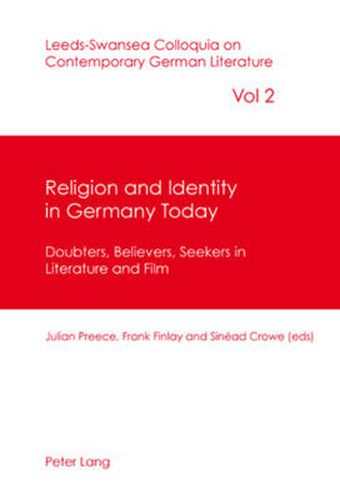Readings Newsletter
Become a Readings Member to make your shopping experience even easier.
Sign in or sign up for free!
You’re not far away from qualifying for FREE standard shipping within Australia
You’ve qualified for FREE standard shipping within Australia
The cart is loading…






This title is printed to order. This book may have been self-published. If so, we cannot guarantee the quality of the content. In the main most books will have gone through the editing process however some may not. We therefore suggest that you be aware of this before ordering this book. If in doubt check either the author or publisher’s details as we are unable to accept any returns unless they are faulty. Please contact us if you have any questions.
In German-speaking Europe, as in other parts of the western world, questions of religious identity have been discussed with sudden urgency since the attacks of ‘9/11’. Nowhere was this clearer than in the heated controversy over the building of a mosque in the city of Cologne, which is the subject of Michael Hofmann’s contribution to this volume. Turkish Germans have also found themselves defined by the religious background of their parents. For different reasons German Jews have faced pressure to reconnect with a religion that their forbears cast off sometimes more than a century ago. At the same time religious belief among the nominally Christian majority has been in retreat. These changes have generated poetry, drama, and fiction as well as a number of films by both well-known and emerging authors and filmmakers. Their works sometimes reflect but more often challenge debates taking place in politics and the media. The essays in this volume explore a range of genres which engage with religion in contemporary Germany and Austria. They show that literature and film express nuances of feeling and attitude that are eclipsed in other, more immediately influential discourses. Discussion of these works is thus essential for an understanding of the role of religion in forming identity in contemporary multicultural German-speaking societies. This volume contains eight chapters in English and six in German.
$9.00 standard shipping within Australia
FREE standard shipping within Australia for orders over $100.00
Express & International shipping calculated at checkout
This title is printed to order. This book may have been self-published. If so, we cannot guarantee the quality of the content. In the main most books will have gone through the editing process however some may not. We therefore suggest that you be aware of this before ordering this book. If in doubt check either the author or publisher’s details as we are unable to accept any returns unless they are faulty. Please contact us if you have any questions.
In German-speaking Europe, as in other parts of the western world, questions of religious identity have been discussed with sudden urgency since the attacks of ‘9/11’. Nowhere was this clearer than in the heated controversy over the building of a mosque in the city of Cologne, which is the subject of Michael Hofmann’s contribution to this volume. Turkish Germans have also found themselves defined by the religious background of their parents. For different reasons German Jews have faced pressure to reconnect with a religion that their forbears cast off sometimes more than a century ago. At the same time religious belief among the nominally Christian majority has been in retreat. These changes have generated poetry, drama, and fiction as well as a number of films by both well-known and emerging authors and filmmakers. Their works sometimes reflect but more often challenge debates taking place in politics and the media. The essays in this volume explore a range of genres which engage with religion in contemporary Germany and Austria. They show that literature and film express nuances of feeling and attitude that are eclipsed in other, more immediately influential discourses. Discussion of these works is thus essential for an understanding of the role of religion in forming identity in contemporary multicultural German-speaking societies. This volume contains eight chapters in English and six in German.